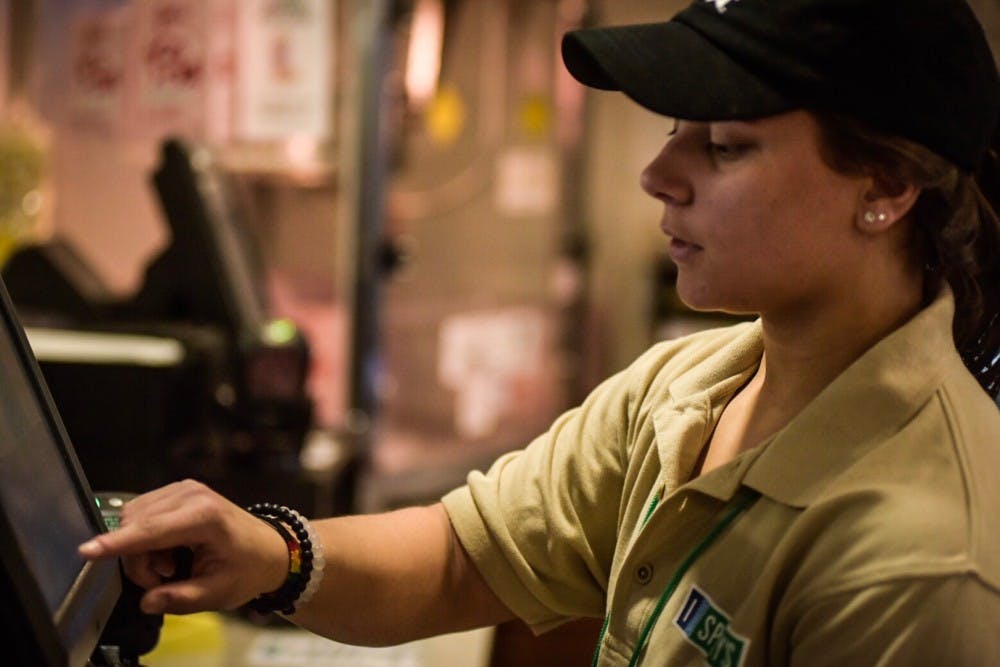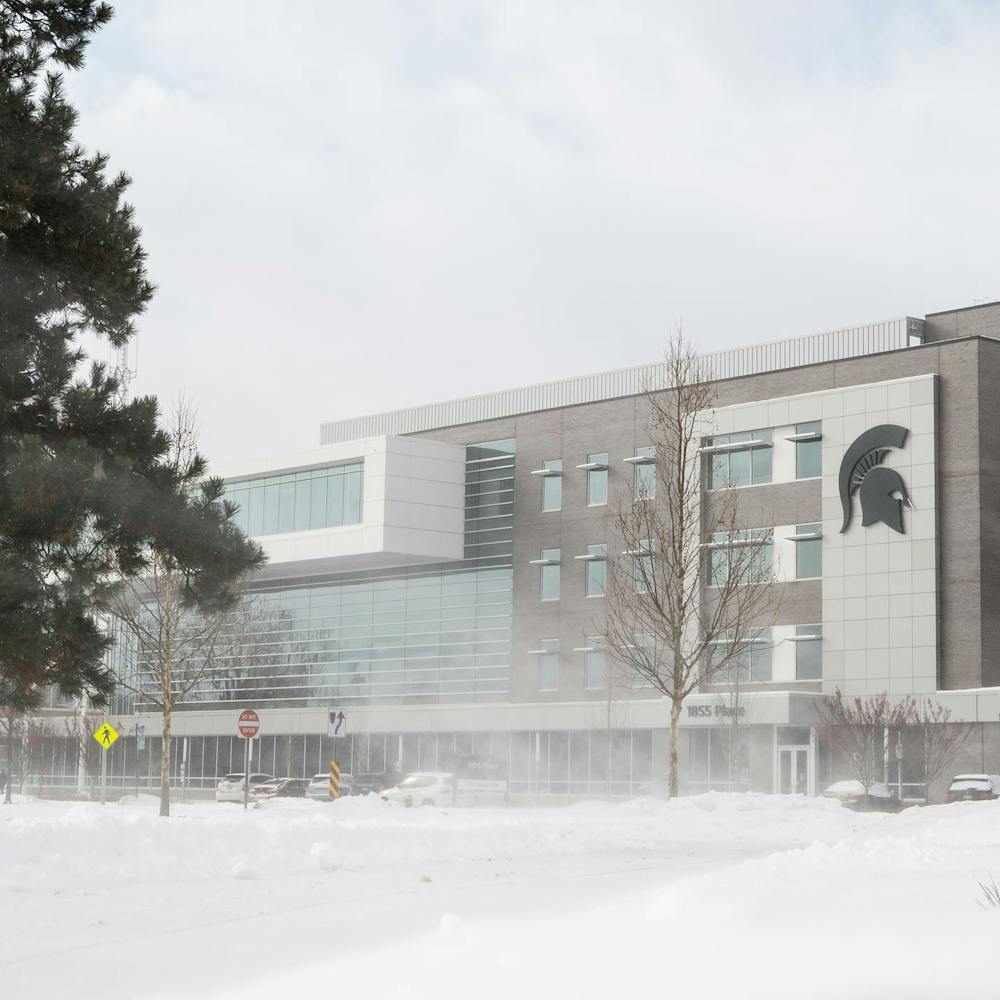Their studies found that about 40 percent of undergraduates and 76 percent of graduate students work at least 30 hours a week, but those numbers still don’t compare to any debt or tuition amounts.
According to College Board, the average budget at a public four-year college for the 2017-18 academic year averaged $20,770 — and the freshman rates of attending MSU are slightly more.
Americans currently owe over $1.45 trillion in student debt amongst 44 million borrowers.
While some students are working to pay off those debts in advance, others are simply in need of some extra cash and the rest are not working at all.
This year, the number of students employed by MSU is 15,240. According to MSU’s Director of the Collegiate Employment Research Institute Philip Gardner, students that work 10 to 12 hours per week on campus actually tend to perform better academically than students who work more and just as good as students who don’t work at all.
“Working can actually make the total experience in school more positive,” Gardner said.
Georgetown’s center found that working while learning can result in better education and a likelihood of a stronger career in the future, especially when the early work is related to their field of study. But do students feel the same?
Working on campus
Special education and language arts senior Mariah Hill said she has jobs both on and off campus, but she doesn’t work for the paychecks — she does it because she loves her work.
“It just really works in terms of my dreams, passions, and one of the things I believe is my calling,” Hill said.
Hill’s campus job consists of mentoring freshman and scholars. She plans to become an administrator in education and through her campus work, she believes she is heading in the right direction.
Unlike Hill, linguistics junior Andrew Brusoe said he works his campus job for extra cash at about 10-20 hours per week.
“It’s nice having a bit of money, but it’s even less time to myself or less time for studying, depending on which one I feel like neglecting that day,” Brusoe said.
Brusoe is not usually stressed by his work responsibilities, and he said his grades are average but a little more time for studying could be useful.
Gardner said the university is trying to encourage students to think about how they will meet MSU’s 12 essentials, a resource provided by MSU's Career Services, as well as having a great motif as to why they are working.
According to Gardner, there tends to be a more positive academic impact when students are working to pay for tuition or room and board, whereas if a student is working to pay solely for social activities, there is a negative impact on their performances.
“Overall, working on campus is a positive unless you do it too much and for the wrong reasons,” Gardner said.
Brusoe, who has worked on campus since his freshman year, said campus jobs are really understanding when it comes to school duties, compared to other places that may not be.
Support student media!
Please consider donating to The State News and help fund the future of journalism.
Prioritizing work
For some, a job can become the focus of their time.
Hill said she had jobs throughout her time at MSU and she found herself applying more efforts toward her work than school, often cutting studies short to assure she woke up for her job on time.
“That should never be the model, that I was going by, so I do think it has an effect on me,” she said.
Hill said her last job demanded a lot of her time and she had a hard time focusing on her studies.
Gardner said some students go as far as keeping their amount of work hours away from academic advisors because their grades weren’t up to par, but they needed the money.
“The bottom line is for a student, you need to make academic progress or it doesn’t matter how much the internship and work experience, you’re not going to have the degree,” Gardner said.
For that reason, Hill said she is not in favor of freshman working when they get to campus.
“I would tell them to figure how they are as a scholar and how well they work, but I mean sometimes that’s not an option for people,” Hill said. “Sometimes some people need to work in order to provide for home back in their native, where they come from and then also while they are here.”
Hill said she believes students are pressured to work when they arrive because MSU isn’t willing to bring many non-students onto campus for open positions.
“These are the people who need the jobs, and these are the people who are willing to do the jobs because, sometimes students, they get ahead of themselves and not want to work for the minimum wage,” Hill said.
There are currently about 300 jobs that are open and available for MSU students, which include internships and work that requires basic skills.
Gardner believes students should be trying to gain work experience whenever they can, because it could help with transitioning to their career after graduation. MSU has these jobs open to give students the chance to apply their skills.
“Every type of work experience can provide practice to move towards your career, some may be directly related of your chosen career,” Gardner said.
Some students agree. Brusoe said he learned the fundamental skills of managing a job and something to put on his resume, besides learning at an institution for five years.
Gardner said some people will have the opportunity for jobs related to their chosen path while others just need to practice working, such as freshman and sophomores.
Students choose not to work
For some students, the pressure of a job is not worth the opportunities.
“There are tradeoffs that have to be made in certain situations and that’s hard to do,” Gardner said.
In advertising management junior Kendall Harris’s case, Gardner is absolutely right.
Harris has a job at home that she returns to once a month on weekends, but she does not work on campus or East Lansing while attending MSU. She said school work keeps her busy enough and she doesn’t want to miss out on having college experiences.
“The fun part of school I think is the tailgates and all that kind of stuff, and I know if I got a job, I’d probably have to work on weekends and I just don’t want to miss that,” Harris said.
Harris said going the semester without a job gives her more time to study for better grades and have time for herself. It also gives her the freedom to meet new people, spend time with friends and join clubs.
Advertising creative junior Kaleb Baker also chooses to be work-free because her schedule is so full and she doesn’t have time, but her parents are helping to enforce for this decision as well.
“I didn’t really need a job when I was in college because my parents kind of like provide for me,” Baker said. “That’s just my reality, I know that’s not everyone else's reality.”
Baker said she tried working in her sophomore year for extra cash without telling her parents, but didn’t feel comfortable balancing her schedule.
Fortunately for Baker, she is a scholarship recipient and her parents pay for all of her expenses such as food, shopping sprees and her dance team while in school.
“They say, 'don’t worry about that, just worry about going to school,' and that’s kind of like how they always were,” Baker said.
Baker said she doesn’t believe her grades are much different than others because regardless if someone has a job or not, the outcome is determined by work ethic.
Harris said she works two jobs each summer and saves for the following school year for her expenses. She also has some help from her parents, but for the first time next semester, she is planning to obtain a job or internship on campus.
Baker said she really wants to work at the makeup retail store Sephora, but she knows her schedule is far too hectic.
“I feel like no one is going to hire me if I say I can only work two days a week for an hour, that’s not reliable,” Baker said.
But jobs may not be meant for every college student as Georgia University’s Health Center studies have shown that students are overloading themselves with activities, depriving themselves of sleep.
While work may not be for everyone, Gardner said he thinks it could be healthy for a student’s future and he wouldn’t dismiss working on campus or treat it as meaningless.
Gardner said most jobs give fundamental basic skills that are potentially the ingredients to become professional.
“Just because you’re doing something that has not related to your career now, doesn't mean that it doesn't have any relationship to how it’s going to help you transition,” he said.
Discussion
Share and discuss “Working while learning: what's best for MSU students?” on social media.







